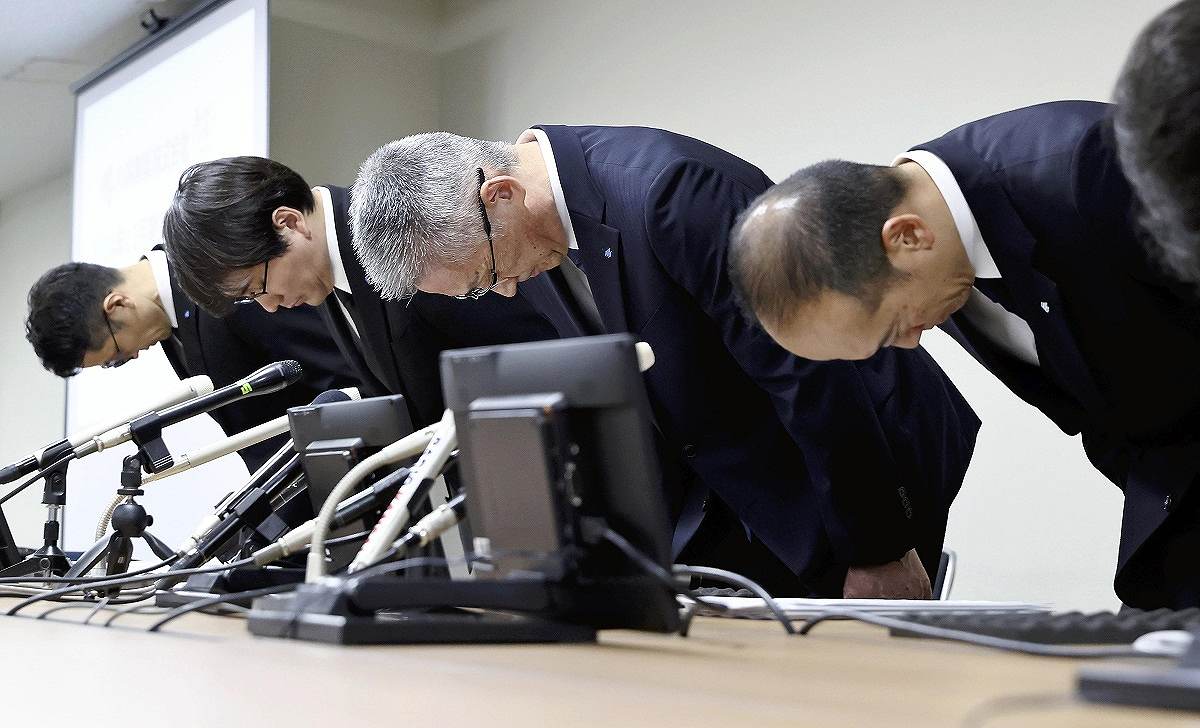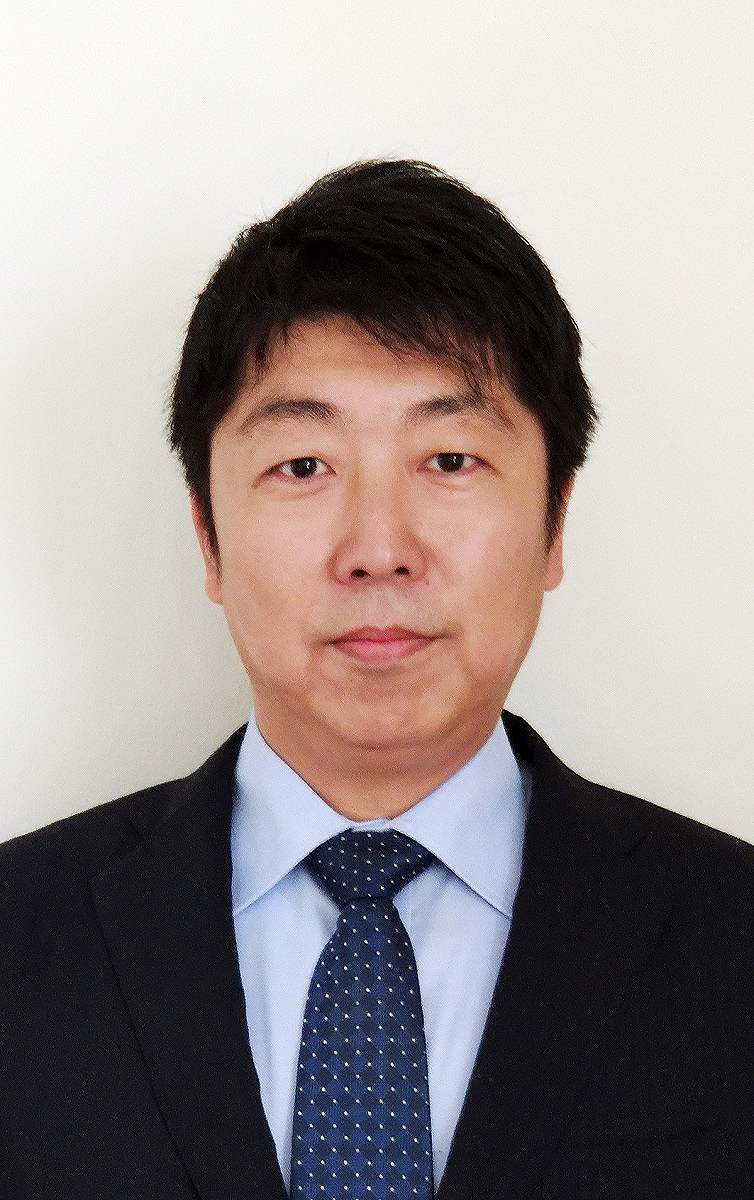
Members of Kobayashi Pharmaceutical Co. management apologize at a press conference on Aug. 8 in Osaka.
8:00 JST, September 28, 2024
Several scandals have involved family-owned companies, including sexual assaults by the founder of the former Johnny & Associates talent agency and fraudulent insurance claims by the former Bigmotor Co., primarily a dealer in used cars. The health problems caused by Kobayashi Pharmaceutical Co.’s supplements containing benikoji red rice mold led to a review of the government’s deregulation system and the end of six generations of family-led management. Are family-owned businesses hotbeds of corruption?
Family-owned businesses run by founders and relatives are the most basic form of corporate management. In many cases, certain relatives, including founders, hold most of the shares and capital invested in a company.
In contrast, the basis of the joint-stock company system is the separation of ownership and management. However, there is a possibility that the interests of the two parties will conflict.
On the other hand, family-owned businesses, in which significant shareholders and managers are monolithic and share a common vision, can eliminate such conflicts of purpose and make it easier to implement consistent strategies.
Toshio Goto, a professor at Japan University of Economics’ Graduate School of Business, is known for his research on long-lived companies. “Managers of family-owned companies recognize not only shareholders but also diverse stakeholders such as employees, customers and local communities,” he says. “In Japan, more than 90% of long-established companies with a history of more than 100 years are family businesses.” Even many major companies, such as Toyota, are considered family-owned.
The most significant personnel change for a company is a change of leadership, in which the president or CEO passes the baton. How is the head of a company chosen? In an ideal world, an undisputed and capable leader is chosen after a proper process. If an organization is able to excel through hard work and results, its employees will spare no effort to keep the company vital. However, such organizations are rare.
In many cases, the organization’s power dynamics are a bigger consideration than individuals’ abilities. Those who are promoted are said to have led the business divisions that earned the most money, turned around loss-making businesses, and created blockbuster products. However, “there are many cases where a big promotion in personnel affairs is actually just cosmetic,” said a senior executive at a megabank.
However, what about family companies, where decisions are often made in a manner close to hereditary succession?
Kobayashi Pharmaceutical is a case in point. Kazumasa Kobayashi, a member of the founding family, resigned as chairman to take responsibility for the benikoji disaster — but then he became a special adviser, receiving a monthly salary of ¥2 million. Kazumasa’s eldest son Akihiro resigned as president but will remain on the board of directors. This is unusual treatment for executives of a company that has been accused of malfeasance resulting in the deaths of customers.
Katsuyuki Kamei, a professor at Kansai University who is an expert on corporate risk management, said: “It is quite a situation that Kazumasa, who was a founding family member and had excellent management skills, resigned as chairperson. Even if the company receives criticism, it will be difficult [for the company] to punish him more harshly. This is the current situation of family management and shows its limitations.”
Managers of family companies tend to hold their posts for a long time, and the problem of dogmatism is likely to arise, meaning that things proceed according to the will of the manager or a tacit understanding among family members. Asked about the pros and cons of family management, Satoshi Yamane, the pharmaceutical company’s new president, said at a press conference, “At best, their solidarity is a strength, but when a problem occurs there is a risk they will be one step behind in responding to it.”
Still, the family remains a significant shareholder. “The family is a significant entity,” Yamane said, expressing the difficulty of separating from family management.
Even so, some companies with global operations are shifting their focus toward greater family control. This is because it is easier to make bold management decisions that consider the interests of the company and its shareholders’ interests. At Seven & i Holdings Co., which focuses on reforms, including the complete withdrawal from its original supermarket business, observers say Vice President Junro Ito, who comes from the founding family, is expected to be promoted to the top position soon.
At Suntory Holdings Ltd., where the challenge is to shore up its original liquor business, a former founding family member will undoubtedly replace President Takeshi Niinami. Pan Pacific International Holdings Corp., which operates the discount store Don Quijote, drew attention when it announced that the founder’s son, who was 22 when he joined the company in January, would be appointed as a director.
In the United States, department store giant Nordstrom Inc. announced in September that it had received a management buyout proposal from Chief Executive Officer Eric Nordstrom, a member of the founding family. As in Japan, the U.S. department store market continues to shrink, and Macy’s, a competitor, has received a takeover offer from an activist. The move by Nordstrom Inc. is believed to be aimed at taking the company private before it is attacked by outsiders and rebuilding its business under the leadership of the unifying family.
However, family-based corporate culture, which seems to allow arbitrariness, is prone to distortions in management. Fujitec Co., a significant elevator company, has become a prime target for activists who accuse it of failing governance due to the influence of the founding family. In 2023, the family was removed from the management, with an investment fund taking complete control. The same fund acquired many shares in Kobayashi Pharmaceutical, and the battle behind the scenes will likely intensify in the run-up to the company’s shareholder meeting scheduled around March next year.
In other words, the biggest challenge in family management is how to keep corporate governance from becoming too rigid. It is essential to create a system that incorporates opinions from outside the management team, such as providing opportunities for managers to listen to the opinions of employees and outside experts. The responsibility of outside directors, the watchdogs of management, is significant.
Taking another perspective, how does the market view family management? In 2018, when the global stock market plunged, only one mutual fund in Japan achieved positive returns. Tokio Marine Asset Management’s Tokio Marine Japan Owners Equity Open focused on family-run companies. “While family-run companies adjust physical investment while maintaining human capital, other companies tend to cut staff but keep investments,” an official in charge said. “In the short term, it is easier for nonfamily companies to secure profits, but from a long-term perspective, the family business approach makes sense,” he said. With family-run companies focusing on relationships and networks, it can be said that the connections they have cultivated will be utilized when a shock comes.
What about growth? In Japan, a study found that one of the patterns of corporate governance with good performance is “family companies that have adopted heirs.” According to this study, the return on assets of family-owned firms run by adoptees in Japan is higher than that of both other family-owned firms and firms that are not family-owned. Because adoptees are selected from within and outside the firm over time, there is little risk that they will be hired for positions for which they are not well qualified. Moreover, adoptees assimilate to hold the same perspectives as those born into the founding families. Again, this is due to the system under which the advantages of corporate governance based on the alignment of ownership and management are quickly realized.
In Japan, the terms “parent gacha” and “company gacha” have been in vogue for several years. The image of a gachapon vending machine that randomly dispenses toys in capsules suggests that young people have no choice but to accept the parents or the employers that are randomly dispensed by fate. This is probably because many young people feel society has become entrenched and stratified. Organizations are prone to collapse if their human resources become ossified and their talented people leave.
Amid Japan’s three lost decades, U.S. tech giants collectively known as GAFA (Google, Apple, Facebook and Amazon) and Chinese ones collectively known as BAT (Baidu, Alibaba and Tencent) have emerged, opening up markets for services that previously did not exist. Even at family-owned companies, the founders were entrepreneurs who took risks and took on new challenges with the ability to develop new business fields. Rather than choosing between hereditary and non-hereditary leadership, we should look for entrepreneurial leaders who will innovate Japanese industries.
Political Pulse appears every Saturday.

Shingo Sugime
Shingo Sugime is a deputy editor in the Economic News Department of The Yomiuri Shimbun Osaka.
Top Articles in Editorial & Columns
-

Riku-Ryu Pair Wins Gold Medal: Their Strong Bond Leads to Major Comeback Victory
-

40 Million Foreign Visitors to Japan: Urgent Measures Should Be Implemented to Tackle Overtourism
-

China Provoked Takaichi into Risky Move of Dissolving House of Representatives, But It’s a Gamble She Just Might Win
-

University of Tokyo Professor Arrested: Serious Lack of Ethical Sense, Failure of Institutional Governance
-

Policy Measures on Foreign Nationals: How Should Stricter Regulations and Coexistence Be Balanced?
JN ACCESS RANKING
-

Japan PM Takaichi’s Cabinet Resigns en Masse
-

Japan Institute to Use Domestic Commercial Optical Lattice Clock to Set Japan Standard Time
-

Israeli Ambassador to Japan Speaks about Japan’s Role in the Reconstruction of Gaza
-

Man Infected with Measles Reportedly Dined at Restaurant in Tokyo Station
-

Videos Plagiarized, Reposted with False Subtitles Claiming ‘Ryukyu Belongs to China’; Anti-China False Information Also Posted in Japan























